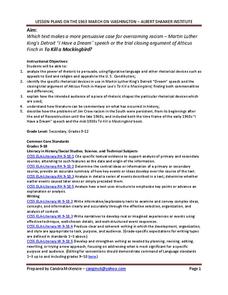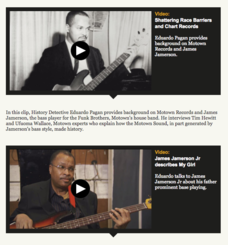Curated OER
Discrimination and the Struggle for Equality: African Americans in Professional Baseball: A Reflection of the Civil Rights Movement
Students develop the ability to research individuals and summarize the basic information on that person's life. They design a logo and graphic setting for a particular set of cards and create a set of trading cards of Negro League...
Curated OER
Celebrating 100 Years of Negro Leagues Baseball
Ninth graders locate original locations of Negro Leagues Baseball teams using latitude and longitude, calculate distances between locations using maps and/or Internet resources, and use critical thinking skills to compare and contrast...
Facing History and Ourselves
The Legacies of Reconstruction
The final instructional activity in the seven-resource Reconstruction Era collection examines the legacies of Reconstruction. Class members investigate why the period has been called an "unfinished revolution," "a splendid failure," and...
Center for History Education
Speaking Up and Speaking Out: Exploring the Lives of Black Women During the 19th Century
Young historians investigate the often-hidden history of free and enslaved African American women before the Civil War. Using a collection of primary and secondary sources, including speeches, diaries, and poems, they evaluate the often...
Anti-Defamation League
The Road to Brown
As part of the study of segregation in U.S. schools, scholars research and create a timeline of events that led to the historic Supreme Court case, Brown V. Board of Education. Groups research a topic or event that led to the decision,...
Albert Shanker Institute
Making the Case for Equality: A Comparison
Martin Luther King Jr's " I Have a Dream" speech and Atticus Finch's closing argument during the trial of Tom Robinson both address the societal need to overcome racism. After examining the rhetorical devices and figurative language used...
US House of Representatives
A Picture is Worth a Thousand Words
Groups select a photograph from one of the four eras of African Americans in Congress and develop a five-minute presentation that provides background information about the image as well as its historical significance. The class compares...
ABCya
Martin Luther King Word Search
Reinforce key terms surrounding Martin Luther King, Jr. with a helpful online word search. Class members choose a small (easier) or big (harder) version and search for words like freedom, leader, and equality.
US House of Representatives
Black Americans in Congress Speak Their Mind
To conclude their study of Black Americans in Congress, groups select a statement made by one of the Members, examine the Member's profile on the provided link, and create a display that includes state represented, years of service, an...
Curated OER
The Civil Rights Movement in Kentucky
Eleventh graders examine how current race relations in their town compare to those of the 1960's.
Curated OER
American Civil War
Eighth graders read a collection of stories about the Civil War. Based upon their readings, they perform various activities to reinforce facts about the Civil War. Students create time lines, maps and reports about the war. They...
Curated OER
How Women Got the Vote: The Story of Carrie Lane Chapman Catt
Students participate in a simulation and compare and contrast the arguments for and against womens' right to vote. In this civil rights lesson, students simulate disenfranchisement of women by allowing only half of the class to vote on a...
Curated OER
A Time for Justice
Young scholars explain the protections and privileges of individuals and groups in the United States.
Curated OER
The Sixties Protests and Social Change
Students identify, examine and analyze photographs of the sixties to determine the forces of social change at work in America during this decade. They determine the goals of each movement and the methods used by each to achieve those goals.
Curated OER
Thoreau, Gandhi, and Martin Luther King, Jr.
Students explore the concept of non-violent resistance. In this political philosophies lesson, students study the political tactics of Mohandas Gandhi, Henry David Thoreau, and Martin Luther King, Jr. in order to discover how each of...
Curated OER
Nativist and Racist Movements in the U.S. and their Aftermath
Students examine the nativist and racist movements in the history of the United States. In groups, they analyze the reactions of religious and ethnic groups to these movements and create a chart to compare the goals of each group. To...
National Endowment for the Humanities
Revolution '67, Lesson 1: Protest: Why and How
To some people, protesting is as American as apple pie, but the factors that lead to protests can be as confusing to veteran activists as to today's youth. Revolution '67 explores the riots in Newark, New Jersey as a case study. Using...
National Endowment for the Humanities
Revolution '67, Lesson 2: What Happened in July 1967? How Do We Know?
Even in a world in which dozens of participants and curious onlookers record every controversial event, the basic facts of what happened are often in dispute. Revolution '67, Lesson 2 explores 1967 Newark, New Jersey using an examination...
PBS
The Sixties: Hitsville USA
James Jamerson. You probably heard him but may not have heard of him. But fans of Motown Records will certainly recognize his contributions to the sound that desegregated popular music during the 1960s. Challenge young history detectives...
Center for History and New Media
The Impact of the Jim Crow Era on Education, 1877–1930s
Even though American slaves were officially emancipated in 1865, the effects of slavery perpetuated throughout the 19th and 20th centuries. Middle and high schoolers learn about the ways that discrimination and the Jim Crow laws...
Curated OER
From Jim Crow To Linda Brown: A Retrospective of the African-American Experience from 1897 to 1953
Learners examine African American issue between the years 1897 and 1953. In this African American history lesson, students research the social, economic, and political conditions of African Americans during the aforementioned time span...
Curated OER
Just-Us and Kindness: A Voice for Children: King Day
Eighth graders investigate philanthropy. In this service learning lesson, 8th graders read human rights literature and use information gleaned to discuss children's rights around the world. Students discuss scenarios meant to prompt...
Curated OER
Equality: Are Some More Equal than Others?
Students research a person who has been active in supporting human rights around the world. They simulate an international conference and write a newsletter focused on human rights in a specific country.
Curated OER
Big Words
Students discover philanthropy. In this philanthropic lesson, students read Martin's Big Words and explore voluntarily being nice to people. Students discover how they may perform acts of service for others. Extension activities are...

























